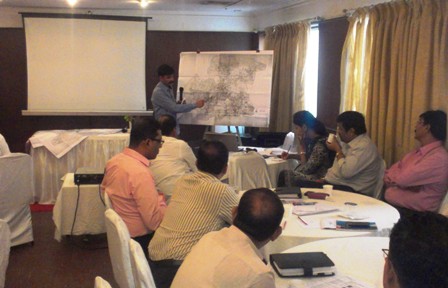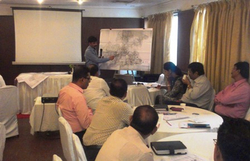Vulnerability assessment exercise at Shared Learning Dialogue in Nashik

Experts from ICLEI South Asia, GIZ, the Nashik Municipal Corporation (NMC), other relevant departments – MEDA, MSEDCL, local NGOs and representatives from the private sector took part in the 3rd Shared Learning Dialogue which was held in Nashik on 25th October 2013. The programme which was organized as the next step in the preparation of the Sustainable Urban Habitat Action Plan (SUHAP) was conducted in the form of a stakeholder dialogue between officials of the respective departments and the core team.
Nashik city is in the process of preparing a sustainable urban habitat action plan in line with the National Mission on Sustainable Habitat (NMSH). With the support of GIZ and ICLEI South Asia, the city is undertaking a climate impact assessment exercise to identify potential risk and adaptation measures to be incorporated in SUHAP, in addition to measures to reduce emissions and improve energy efficiency.
The data analysis and gaps with regards to adaptation and mitigation were discussed with the stakeholders in this programme. The ICLEI South Asia team conducted a vulnerability assessment exercise to identify the vulnerable areas, in terms of Wards, and specific social groups in the city for the impacts on the seven urban systems that were identified in the previous stakeholder consultation; the seven systems are those listed in the NMSH and include: storm water, urban planning, water supply, transportation, sewerage, solid waste management and energy.
Towards the end of the programme, the ICLEI South Asia team shared the analysis of the energy consumption data collected for Nashik city with the stakeholders. The data gaps to complete the GHG inventory for the city were also identified during the discussions and suggested measures to complete the data were given by the stakeholders present.
The ACCCRN toolkit that has been developed by ICLEI and that will be replicated in approximately 40 cities across four countries is also being used in Nashik to develop its sustainable urban habitat action plan.




